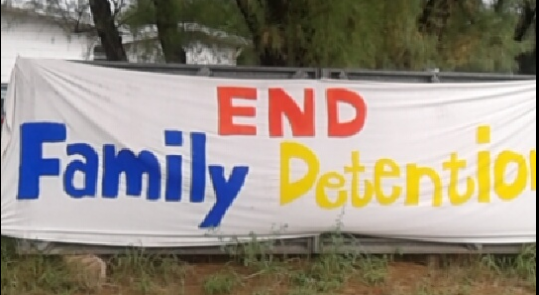|
At the end of August, our legal assistant, Karina, travelled to Dilley, Texas to volunteer for a week at the family detention center. Read about her experience serving the detained below:
Once they arrive to the United States, border officials are telling women they are criminals and liars. Because detention centers must meet a certain number of quotas, many women and children are detained while few are released to their families in the United States. The women and children who are detained are sent to the “Ice Box”, “Kennel” or both. These are the nicknames given by the women.
We all shared one goal: to release as many women and children from the detention center. As a volunteer, my day started by going through security and getting ready for the first intake presentation. I wasn't allowed to bring my phone, or even my toothpaste into the facility. I assume this is to make it seem like the women and children are dangerous. The first intake presentation started at 8 am. Each day, 60-80 newly detained women would gather for our presentation. We explained who we were, why they were detained and the asylum process. The second group were for the women with credible fear interviews scheduled. The women would gather in a circle and I would give a presentation on what type of questions they should expect and encourage them to share as much detail as possible. Those who speak an indigenous language, listen to a recording in their native language. These recordings were made by previously detained women who wanted to pass on the knowledge of the immigration process in their native languages.
After the group presentation, we would provide individual mock hearings for the women. Each woman was paired with a volunteer in a closed room so the women would feel comfortable sharing their story. It was difficult for them to share their past because they try to avoid reliving the traumatic experiences of assault, rape, and domestic violence. My goal was to empower these women to share their stories with the immigration officials without feeling ashamed of their past or their decision to provide a better life for their children. Each of these mock interviews would last about 30 minutes and were emotionally exhausting. At times, the whole experience felt surreal- why were we spending valuable tax dollars to detain these helpless women and children? Our work with the women would end at 8 pm, but some days we would stay for mandatory staff meetings. Even when there were no meetings, we would gather as a group for a late dinner. All the volunteers and staff I worked with were amazing and had such big hearts. We all shared one goal: to release as many women and children from the detention center. If you interested in volunteering, you don’t have to be an attorney or speak Spanish. You can also help the project by donating money and supplies at http://caraprobono.org/. You can also help by bringing social awareness to family detention- there are a group of women in the Berks Detention Center who have been detained for more than a year now. Above all, let’s work together to END FAMILY DETENTION. Karina Perez-Gonzalez, September 2016
0 Comments
Leave a Reply. |
AuthorKim Le is an immigration attorney from Portland, Oregon. She is the owner of Le Immigration Law, LLC. Archives
December 2017
Categories |
Disclaimer: The information in this website is not legal advice, and your use of it does not create an attorney-client relationship. Any liability that might arise from your use or reliance on this website or any links from this website is expressly disclaimed. This website is not legal advice, is not to be acted on as such, may not be current and is subject to change without notice. In accordance with rules established by the Oregon Rules of Professional Conduct, this web site must be labeled "advertising." It is designed to provide general information for clients and friends of the firm and should not be construed as legal advice, or legal opinion on any specific facts or circumstances.

 RSS Feed
RSS Feed
